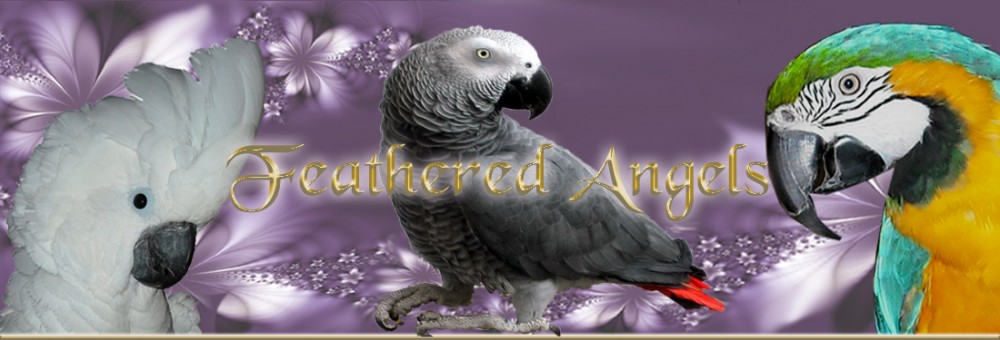Your Feathered Angels will need a qualified Avian Vet and do not wait until they are sick. Parrots naturally hide illness and by the time they are showing signs of being sick, it can be too late. In the wild they will be abandoned by their flock if they are ill, and so it is their nature to hide illness as long as possible.
Interview your Vet and ask how many years they have been treating Parrots, if they are board-certified, where they studied, and what their specialty may be. You should feel comfortable asking your Vet questions and you should feel comfortable with them handling your Parrot. Don’t allow your Feathered one to be handled roughly or cruelly by anyone. Always stay in the room with your Parrot during examinations or treatments. Most Avian Vets welcome the caregiver to be present at all times. I would be leery of an Avian Vet that didn’t allow you to be in the room with your Parrot during examinations or treatments.
Find an Avian Vet in your area Association of Avian Veterinarians
- Regular annual checkups will help your Vet run tests that can catch viruses, bacterial infections, etc., and then prescribe medications before it becomes too late.
- Weighing your bird regularly can often catch illness quickly. The first sign of illness is often a slight weight loss. You should purchase a gram scale and weigh your Parrot weekly. Keep a log of your bird’s weight so you know if their weight is changing. Should your bird start to lose weight, call your vet immediately.
- Monitor your Parrot’s droppings. You should use newsprint or another type of safe paper on the bottom of the cage so that you can see the droppings. Never use corncob-type bedding, as this can harbor bacteria and cause all sorts of problems. You should note the amount of droppings your bird produces a day. Should this amount change, call your vet. If the droppings begin to change color that can’t be explained by a diet change (i.e. blueberries will turn the droppings blue, raspberries will turn them red, pellet eaters will usually have brown droppings, while seed eaters will usually have green droppings) call your vet.
- A healthy diet is key in health and longevity for your Parrot. Here is a link to a collection of articles on Nutrition Articles on Nutrition
- Watch your bird’s daily habits and know their individual personalities. If your bird’s daily habits change, call your vet. Any change in sleeping, eating, playing can be a warning sign! Anything out of the ordinary should be a concern. Part of being a good caregiver is knowing your Feathered Angel very well!
Accidents can and will happen! Keep an Avian First Aid kit ready at all times. Know what to do in an event of an emergency. Be prepared by know how to take care of your Parrot at home if she’s injured. First Aid and Emergency Care
Here are some ways that you can help prevent accidents or injuries from occurring.
- Provide safe toys that are sized appropriately for your Parrot, and shouldn’t contain any parts that could catch a leg, wing, or head. Don’t use toys that have bells or key rings, as these can be dangerous. Remove or repair toys that have bits of string hanging off them, this can choke your bird, or your bird could become tangled and loose a foot, and your bird could ingest it and get become impacted.
- Keep your Parrot away from other pets. Even birds of various sizes need to be kept separately to insure their safety. Parrots need to be supervised at all times when out of their cages. I have read many heart breaking stories of a larger Parrot maiming or killing a smaller one. Many times the caregivers have stated that the two Parrots got along fine for years and suddenly one day there was an attack. Cats, dogs and ferrets can be very dangerous. Cats have a bacteria in their claws and mouths that can kill birds very quickly. Ferrets naturally hunt birds! Even the most mellow and well disposition of dogs can suddenly snap and attack your Parrot.
- Parrot Proof all rooms of your home that your bird will have access to. This means covering up any loose wires or power cords. Cover or put away everything that you don’t want destroyed. Mirrors and windows can be very dangerous if your bird flies into them. You can hang sheer curtains over windows and keep mirrors in rooms not occupied by your Parrot. View your home from your bird’s perspective, if it looks fun to chew on or hide in… then they will do just that :).
When going on vacation or any type of absence from your home, make sure that those who are caring for your Feathered ones are truly knowledgeable. It also helps if your bird is familiar and comfortable with this person. Parrots can stress and worry when their caregivers are away. Have complete instructions printed out, so that they have step by step details of their daily routine and any specific things to watch for. Have them watch closely to amounts of food and water being consumed. Make sure they have your AV’s phone number and directions. Notify your AV that you are going to be away and who is caring for your Parrot.
It is your responsibility to care for these magnificent creatures. Be diligent with your bird’s health to ensure they have a full lifespan. Life in captivity is already so difficult on them, the very least we can do is keep them healthy and safe!!!
Deborah
Copyright © 2011 Deborah FeatheredAngels
All rights reserved
(My articles are free to repost, just do so in their entirety)
